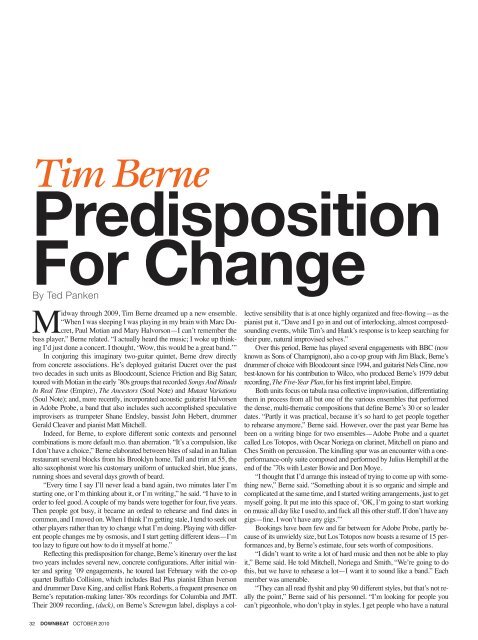Download - Downbeat
Download - Downbeat
Download - Downbeat
You also want an ePaper? Increase the reach of your titles
YUMPU automatically turns print PDFs into web optimized ePapers that Google loves.
Tim Berne<br />
Predisposition<br />
for Change<br />
By Ted Panken<br />
Midway through 2009, Tim Berne dreamed up a new ensemble.<br />
“When I was sleeping I was playing in my brain with Marc Ducret,<br />
Paul Motian and Mary Halvorson—I can’t remember the<br />
bass player,” Berne related. “I actually heard the music; I woke up thinking<br />
I’d just done a concert. I thought, ‘Wow, this would be a great band.’”<br />
In conjuring this imaginary two-guitar quintet, Berne drew directly<br />
from concrete associations. He’s deployed guitarist Ducret over the past<br />
two decades in such units as Bloodcount, Science Friction and Big Satan;<br />
toured with Motian in the early ’80s groups that recorded Songs And Rituals<br />
In Real Time (Empire), The Ancestors (Soul Note) and Mutant Variations<br />
(Soul Note); and, more recently, incorporated acoustic guitarist Halvorsen<br />
in Adobe Probe, a band that also includes such accomplished speculative<br />
improvisers as trumpeter Shane Endsley, bassist John Hebert, drummer<br />
Gerald Cleaver and pianist Matt Mitchell.<br />
Indeed, for Berne, to explore different sonic contexts and personnel<br />
combinations is more default m.o. than aberration. “It’s a compulsion, like<br />
I don’t have a choice,” Berne elaborated between bites of salad in an Italian<br />
restaurant several blocks from his Brooklyn home. Tall and trim at 55, the<br />
alto saxophonist wore his customary uniform of untucked shirt, blue jeans,<br />
running shoes and several days growth of beard.<br />
“Every time I say I’ll never lead a band again, two minutes later I’m<br />
starting one, or I’m thinking about it, or I’m writing,” he said. “I have to in<br />
order to feel good. A couple of my bands were together for four, five years.<br />
Then people got busy, it became an ordeal to rehearse and find dates in<br />
common, and I moved on. When I think I’m getting stale, I tend to seek out<br />
other players rather than try to change what I’m doing. Playing with different<br />
people changes me by osmosis, and I start getting different ideas—I’m<br />
too lazy to figure out how to do it myself at home.”<br />
Reflecting this predisposition for change, Berne’s itinerary over the last<br />
two years includes several new, concrete configurations. After initial winter<br />
and spring ’09 engagements, he toured last February with the co-op<br />
quartet Buffalo Collision, which includes Bad Plus pianist Ethan Iverson<br />
and drummer Dave King, and cellist Hank Roberts, a frequent presence on<br />
Berne’s reputation-making latter-’80s recordings for Columbia and JMT.<br />
Their 2009 recording, (duck), on Berne’s Screwgun label, displays a col-<br />
32 DOWNBEAT OCTOBER 2010<br />
lective sensibility that is at once highly organized and free-flowing—as the<br />
pianist put it, “Dave and I go in and out of interlocking, almost composedsounding<br />
events, while Tim’s and Hank’s response is to keep searching for<br />
their pure, natural improvised selves.”<br />
Over this period, Berne has played several engagements with BBC (now<br />
known as Sons of Champignon), also a co-op group with Jim Black, Berne’s<br />
drummer of choice with Bloodcount since 1994, and guitarist Nels Cline, now<br />
best-known for his contribution to Wilco, who produced Berne’s 1979 debut<br />
recording, The Five-Year Plan, for his first imprint label, Empire.<br />
Both units focus on tabula rasa collective improvisation, differentiating<br />
them in process from all but one of the various ensembles that performed<br />
the dense, multi-thematic compositions that define Berne’s 30 or so leader<br />
dates. “Partly it was practical, because it’s so hard to get people together<br />
to rehearse anymore,” Berne said. However, over the past year Berne has<br />
been on a writing binge for two ensembles—Adobe Probe and a quartet<br />
called Los Totopos, with Oscar Noriega on clarinet, Mitchell on piano and<br />
Ches Smith on percussion. The kindling spur was an encounter with a oneperformance-only<br />
suite composed and performed by Julius Hemphill at the<br />
end of the ’70s with Lester Bowie and Don Moye.<br />
“I thought that I’d arrange this instead of trying to come up with something<br />
new,” Berne said. “Something about it is so organic and simple and<br />
complicated at the same time, and I started writing arrangements, just to get<br />
myself going. It put me into this space of, ‘OK, I’m going to start working<br />
on music all day like I used to, and fuck all this other stuff. If don’t have any<br />
gigs—fine. I won’t have any gigs.’”<br />
Bookings have been few and far between for Adobe Probe, partly because<br />
of its unwieldy size, but Los Totopos now boasts a resume of 15 performances<br />
and, by Berne’s estimate, four sets worth of compositions.<br />
“I didn’t want to write a lot of hard music and then not be able to play<br />
it,” Berne said. He told Mitchell, Noriega and Smith, “We’re going to do<br />
this, but we have to rehearse a lot—I want it to sound like a band.” Each<br />
member was amenable.<br />
“They can all read flyshit and play 90 different styles, but that’s not really<br />
the point,” Berne said of his personnel. “I’m looking for people you<br />
can’t pigeonhole, who don’t play in styles. I get people who have a natural

















